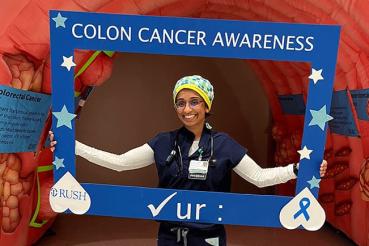Even the most sophisticated among us pass gas — often more than 14 times a day without realizing it. When it happens unexpectedly, it can be embarrassing. But is flatulence ever more than just a social faux pas?
Most of the time, gas is not a medical problem, says Mark DeMeo, MD, a gastroenterologist at RUSH. Sometimes, though, it can signal something more serious.
What causes gas?
Gas comes from the air you swallow when you eat or drink too fast and from the normal function of your colon. Excess swallowed air is removed by belching or eventually expelled through the rectum.
In the colon, gas is created when food is broken down by bacteria. Some foods, such as lactose (the sugar found in milk), are harder to digest than others.
"Most sugars are absorbed in the small intestine, but those that aren’t move on to the colon, where there are high concentrations of bacteria, and then it’s feeding time at the zoo," DeMeo says. "It starts generating a lot of gas."
Eating too much fiber at any one time, adding fiber to your diet too quickly (by more than one serving every three to four days) and varying the amount of fiber you consume from day to day can also cause excess — albeit harmless — gas.
Sometimes gas itself isn't to blame. It's how our bodies react to it. People with irritable bowel syndrome (IBS), for example, may feel bloated even when they have a normal amount of gas, DeMeo says. That's because their intestinal muscles and nerves are highly sensitive to the stretching sensation caused by gas.
In addition to IBS, other conditions linked to gas symptoms include celiac disease, colon cancer — even ovarian cancer. People may also attribute the pain associated with heart disease, gallstones or appendicitis to gas-related pain.
Getting help
Most of the time, over-the-counter medications or simple changes in diet will reduce the discomfort associated with gas. But if they're not working for you, it's time to see your doctor. It's especially important to talk to a doctor if you also have abdominal pain, vomiting, diarrhea, constipation or unexplained weight loss.
Your doctor will evaluate your symptoms, give you a full physical exam and review your medical history. He or she may also suggest, as DeMeo does, that you keep a food diary to see how your diet influences your symptoms.
If symptoms associated with gas are bothering you, see a doctor. Let us make sure there is nothing seriously wrong and then come up with some treatment strategies to help you get relief.
To rule out a serious disorder, your doctor may further recommend a colonoscopy or sigmoidoscopy — both of which examine the large intestine — or an upper gastrointestinal series, which examines the esophagus, stomach and first section of the small intestine.
Treatment will depend on your age, overall health and medical history; the extent of your condition; your tolerance for medications, procedures or therapies; and your expectations and preferences.
"If symptoms associated with gas are bothering you, come in," DeMeo says. "Let us make sure there is nothing seriously wrong and then come up with some treatment strategies to help you get relief."




